Статьи журнала - Arctic and North
Все статьи: 972
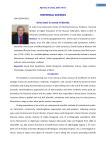
Dvina Land: in search of identity
Статья научная
As a historic-geographical term, Dvina Land is localized by archeologists since the 10th century and is identified with Zavolochye. Administratively it was a part of Velikiy Novgorod (10—16th centuries), Grand Duchy of Moscow and centralized Russian State, transforming into Dvina uyezd (16—18th centuries) and Dvina province (1719—1785). As a multidisciplinary research object, it is systematically defined in several dimensions: landscape and natural, historic-geographical, administrative and governmental, cultural, socio-economic, mythical.
Бесплатно
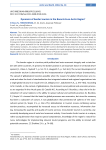
Dynamics of border tourism in the Barents Euro-Arctic Region
Статья научная
The article discusses the main types and characteristics of border tourism in the countries of the Barents region. It provides official statistics on the number of trips, the results of tourist motivation study and reveals the positive dynamics of border tourism development. The materials of the current study in-clude a review and comparative analysis with data obtained during research sessions since 2013 within the framework of the international program Bachelor of Northern Studies. According to the survey, the Barents region has a great potential for the development of tourism and positive motivation that contributes to international contacts. An analysis of the border tourism development dynamics has shown an increase in the demand in the tourism services market, the necessity to create programs focused on the needs of the target audience of buyers, and the active promotion of Russian tourism in the international market.
Бесплатно
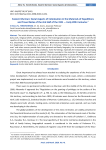
Статья научная
The article discusses several social aspects of the colonization of Eastern Murman (everyday life, daily work, religious beliefs, schooling, leisure). The historiographic analysis made it possible to identify the specifics of the local (everyday) history of the Kola Peninsula colonization. In the works of A.P. Engelhardt, A.G. Slezskinsky, S.Yu. Witte, S.O. Makarov, V.I. Nemirovich-Danchenko, K.K. Sluchevsky, D.N. Ostrovsky, A.K. Engelmeyer, V.I. Manotskov, A.K. Sidensner, N.V. Romanov, “Materials on the statistical study of Murman” and other sources provide facts from personal and family biography, the circumstances of resettlement to the Murmansk coast, living conditions, home furnishings, especially the education and upbringing of children. The descriptions of the migrants’ lifestyle recorded in the materials of expeditions and travel notes allow us to conclude that the colonists’ socio-cultural adaptation in Eastern Murman, the creation of a human habitat, was primarily associated with the development of the institution of the family. In general, the history of colonization is a unique experience in the development of the Arctic - one of the most productive in world history, which is vital for understanding the Russian North’s geography.
Бесплатно
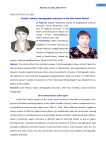
Eastern Yakutia: demographic processes in the post-Soviet period
Статья научная
This article reflects the statistical analysis of all demographic indexes of East Yakutia for the post-Soviet period (1989—2010), which shows its deterioration. Also depopulation occurred. However, despite negative processes, there are prerequisites for recovery of demographic potential. Optimism is connected with megaproject implementation, which can revive it. In 2007 the investment project “Complex Development of the Tomponsky Mining Region” was adopted for realization in the republic.
Бесплатно
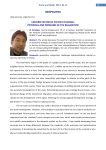
Eastern vector of politics in Russia: potential and problems of the realization
Статья научная
The article discusses the need for transition from an extensive to an intensive strategy of modernization processes in the Far Eastern regions as the key to their success. The ‘new’ industrialization of Yakutia should focus on energy saving technologies, the use of local labor resources and improving the quality of human life.
Бесплатно
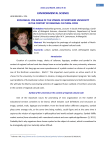
Ecological Preimage of the Symbol of Northern University in the context of Regional Cultural Code
Статья научная
We investigate the preimage of ecological symbol of Northern University in the context of regional cultural code.
Бесплатно
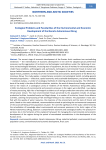
Статья научная
The current stage of economic development of the Russian Arctic combines two contradicting tendencies — the intensification of economic development in line with the adopted special preferential measures and the aggravation of technical and technological contradictions under the tightening of sanctions and technological blockade, increasing wear of equipment, the loss of markets for extracted products. Under these conditions, anthropogenic and, particularly, technogenic environmental threats to nature and human habitat become the most important risk factor. The purpose of the work is to identify current ecological threats, problems and features of the environmental and economic development of the Nenets Autonomous Okrug. The study applies a comprehensive economic and sociological toolkit, including general theoretical approaches — dialectical, spatial economics and sustainable development, and private methods — statistical analysis, a number of sociological methods of collecting and processing data. The information basis of the study is the data of official authorities, statistics, the work of domestic and foreign scientists, as well as the results of a sociological survey of residents of the Nenets Autonomous Okrug (May 2022; n=539). Key features of environmental and economic processes in the region were identified. Low degree of waste processing, high risks of technogenic accidents at oil and gas production enterprises and transport infrastructure remain. The main environmental threats perceived by the population include oil and gas production facilities, household waste and illegal dumps. In a number of territories, threats from defense activities, catching and processing of fish and illegal fishing are also relevant. The population is least satisfied with the quality of water resources, the cleanness of the environment and the state of forests and parks. Based on the results obtained, recommendations aimed at optimizing the environmental component of the social well-being of the population are given. The scientific significance of the study is determined by the actualization of knowledge about environmental and economic processes in the Arctic region of the Nenets Autonomous Okrug, based on a comprehensive economic and sociological toolkit. The practical importance lies in the formation of the analytical framework for managing the environmental and economic development of the regions during the period of exacerbated contradictions in the development of the Russian Arctic.
Бесплатно
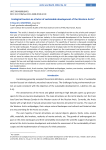
Ecological tourism as a factor of sustainable development of the Western Arctic
Статья научная
The article is based on the expert assessment of ecological tourism as the priority and competitive type of recreational nature management in the Western Arctic. The theoretical provisions are developed and the importance of the tourism industry in the sustainable development of the Russian Arctic is determined based on the analysis of problems and prospects of the modern development of ecological types of tourism in the regions and centers of tourism. The specificity of tourism is discussed considering the increased interest in the Arctic, the growth of cruise tourism and the increase in the anthropogenic load on the polar landscapes. Proposals are given and priority strategic tasks for the development of Arctic tourism are formulated: minimization of anthropogenic impact on the environment and preservation of the cultural and natural heritage of the Arctic, increasing the availability of Arctic territories for tourists. Development of competition in the field of transport, simplification of logistics, the combination of sea cruises with air travel to reduce the cost of travel for those wishing to visit the unique high-latitude Arctic territories and increase the tourist flow. Due to the predominance of expensive types of tourism in the Arctic, support for low-cost and high-income tourism destinations is needed. Innovative investment projects in the field of the Arctic tourism based on clusters could attract tourists and additional investments in infrastructure modernization.
Бесплатно
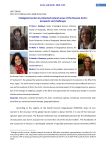
Ecological tourism in protected natural areas of the Russian Arctic: prospects and challenges
Статья научная
The article focuses on the problems and prospects of the ecological tourism in the natural protected areas (NPA) in the Russian Arctic. It is proposed to create a unified terminological basis for the concept of “ecotourism”. We analyzed the systemic problems that hinder the development of ecotourism in the NPA of the Arctic region. The article shows arising recreational conflicts, caused by environmental and traditional land use issues and the existence of NPA in the Arctic. We also discuss promising aspects of the ecological tourism, preservation of the heritage of indigenous peoples of the North and opportunities for involving local people in economic activities and environmental education.
Бесплатно
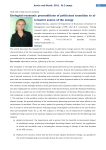
Ecological-economic preconditions of politicians transition to alternative source of the energy
Статья научная
The article discusses the reasons for the transition to alternative energy sources. The comparative characteristics of the fuel component quantities of heat when using different fuels and justify the economic benefits of biofuels. Environmental benefits of biofuels are considered, the economic preconditions for increasing its consumption.
Бесплатно
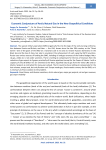
Economic Conjuncture of Arctic Natural Gas in the New Geopolitical Conditions
Статья научная
The special military operation (SMO) organically fits into the logic of the century-long confrontation between Russia and Britain, and later — the USA, known since the late 18th century as the “Great Game”. One of the goals of the SMO on a national scale is not only to restore Russia’s dominance in the Black Sea and the Sea of Azov, but also to counteract the achievement of such a goal by NATO countries. Russia uses various sources of funding the SMO, including oil and gas revenues of the Federal budget. Natural gas, unlike oil, is not under sanctions. There is nothing to compensate for the loss of revenues from the reduction of gas exports to Europe: practically all Russian pipelines (except for the Power of Siberia-1 with a capacity of only 38 billion m3) are oriented to the West; liquefied natural gas from the Yamal LNG and Sakhalin-2 projects is contracted for many years ahead. The EU countries have nothing to compensate for the lost volumes, except coal, but only Russian coal. Europe needs gas, Russia needs currency for the SMO, so it is necessary to find a solution to the problem.
Бесплатно
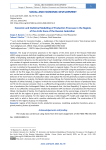
Статья научная
The study of economic processes in the regions of the Arctic Zone of the Russian Federation (AZRF) using economic-statistical modelling methods is an important area of Arctic research due to the possibility of displaying statistically significant relationships of economic processes and phenomena and forecasting economic dynamics, but the potential of such modelling is limited by the specificity of the processes of a number of regional economies in the Arctic, distorted by the increased state presence and active management intervention in the Arctic. Therefore, economic and statistical studies of the Russian Arctic regions are rare in relation to the popularity of the Arctic topics in regional studies. The aim of the study is economic- statistical modelling of production processes in the regions of the AZRF using the production function (PF) toolkit. At the first stage, the analysis of correlations between GRP and factors of production was carried out, on the basis of which the AZRF regions were divided into three groups: 1) regions in which the mutual behavior of the main factors of production (labor and capital) fits into the generally accepted concepts (the Russian Federation as a whole, the Nenets Autonomous Okrug, the Yamalo-Nenets Autonomous Okrug, the Republic of Sakha (Yakutia)); 2) regions in which the mutual behavior of the main factors of production does not fit into the classical concepts: there is a sufficiently strong positive relationship with only one of the factors of production (the Arkhangelsk Oblast, the Krasnoyarsk Krai, the Komi Republic); 3) regions for which there is no sufficiently strong positive relationship between GRP and factors of production (the Murmansk Oblast, the Republic of Karelia, the Chukotka Autonomous Okrug). At the second stage, at least 4 PF models were built for the regions of group 1 (the best model was selected using the Akaike information criterion adjusted for small samples). For the regions of group 2, Cobb-Douglas PF models and single-factor models were built, in which a factor with a positive relationship with GRP was included. The construction of PF models for the regions of group 3 is impossible.
Бесплатно
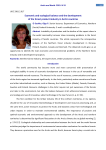
Статья научная
Instability of production and the decline of the export share in the world commodity turnover show increasing problems in the forest industry of Nordic countries. The article represents the retrospective analysis of the Northern forest industry development in Norway, Finland, Sweden, Canada and Denmark. The obtained results give us an opportunity to identify the main economic and environmental problems of the Northern forest industry and its development prospects.
Бесплатно
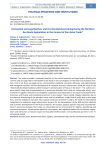
Статья научная
The article provides a systematic analysis of the critical economic and legal factors affecting the current state of cargo flow in the Northern Sea Route in the convergence of the Asian and European markets. First of all, these are legal norms, environmental standards, economic efficiency and organizational and managerial motives, and the development of transport and port infrastructure along the route of the “historically developed national unified transport communication of Russia in the Arctic”. The authors propose specific steps and recommendations to overcome obstacles that create an unfavorable barrier environment for logistics companies to strengthen cooperation and interaction on an equal and mutually beneficial basis with Russia and counterparty partners in the market. These include irregular deliveries due to the seasonal functioning of the transport route and ice conditions, a high level of tariffs due to low cargo flow, and the inability to transport return goods. Particular attention is paid to the need for international cooperation to implement large infrastructure projects for the development of the NSR and the industrial and economic development of the Arctic territories. The authors propose specific steps and recommendations to overcome obstacles that create an unfavorable barrier environment for logistics, stevedoring and insurance companies, infrastructure operators, ship-owners and regulatory authorities to enhance cooperation and interaction on Russia’s equal and mutually beneficial basis and counterparty partners in the international market.
Бесплатно







